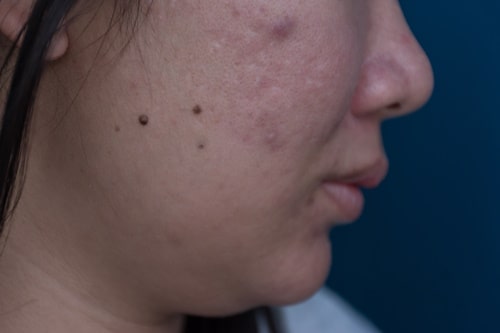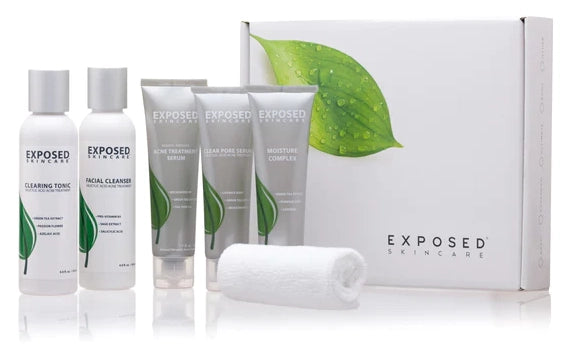Acne is a prevalent skin condition that affects millions worldwide. Among various options, metronidazole, or Metrogel, is often described as a potential solution.
However, it's crucial to understand that Metrogel may not be the best option for managing acne. This comprehensive article focuses on Metrogel's composition, intended use, and potential drawbacks.
Also read: How to choose the best acne treatment
Biggest Take-Aways:
- Metrogel, containing metronidazole, is more effective for treating rosacea than acne vulgaris.
- Using Metrogel for acne can lead to skin irritation and might not effectively address the root causes of acne.
- Proper application and understanding of Metrogel's interactions and side effects are crucial for those considering its use.
- Exposed Skin Care emerges as a more targeted and effective alternative for treating acne, offering comprehensive acne management without the concerns associated with metronidazole-based products.

Understanding Metrogel and Its Primary Use
Metrogel contains metronidazole, an antibiotic that's effective in treating certain skin conditions. It's widely recognized for its role in managing rosacea, a skin condition characterized by redness, swelling, and sometimes acne-like bumps.
The Composition and Function of Metrogel
Metronidazole, the active ingredient in Metrogel, is an antibiotic that's been proven effective in treating inflammation and bacterial growth. When formulated as a gel, it's designed for topical use
It is usually applied to the skin once or twice daily. The gel formulation allows for a targeted approach, focusing on specific areas of the skin.
How Metrogel Works for Rosacea
- Reduces Inflammation: Metrogel helps in reducing the swelling and redness caused by rosacea.
- Controls Bacterial Growth: The antibiotic properties of metronidazole help control the bacteria contributing to rosacea symptoms.
- Promotes Skin Healing: Regular application can lead to an improvement in skin texture and appearance.
However, it's crucial to differentiate between the symptoms of rosacea and those of acne, as the underlying causes and appropriate treatments can significantly differ.
Reason #1: Ineffectiveness for Acne Vulgaris
Acne vulgaris, commonly known simply as acne, is a different skin condition from rosacea, though they may share some superficial similarities.
Differences Between Acne Vulgaris and Rosacea
- Causes: Acne is primarily caused by clogged pores, excess oil production, and bacteria, whereas rosacea is more related to inflammation and blood vessel abnormalities.
- Symptoms: While both conditions can present with redness and bumps, the nature of these symptoms differs significantly.

Why Metrogel Might Not Work for Acne
- Targeted Action: Metrogel is formulated to reduce inflammation and bacterial growth associated with rosacea, not acne vulgaris.
- Lack of Comedolytic Properties: Acne treatments often require agents that can unclog pores, a property that Metrogel lacks.
Reason #2: Potential Side Effects and Skin Irritation
Like any medication, Metrogel comes with its own set of potential side effects, which can be particularly problematic for individuals with acne.
Common Side Effects of Metrogel
- Skin Irritation: Users may experience dryness, itching, or redness when applying the gel.
- Allergic Reactions: Though rare, some may develop an allergy to metronidazole, leading to more severe reactions.
How These Side Effects Impact Acne
- Exacerbation of Acne Symptoms: Skin irritation and dryness can worsen acne symptoms, leading to more pronounced redness and discomfort.
- Risk of Additional Breakouts: Irritated skin can become more susceptible to breakouts, counteracting any potential benefits of using the medication for acne.
Reason #3: Drug Interactions and Proper Use Concerns
The effective use of any medication involves understanding its interactions with other substances and the proper way to apply it.
Understanding Metrogel's Interactions
- Drug Interactions: Metrogel can interact with certain medications, potentially altering its effectiveness or increasing side effects.
- Alcohol Interaction: While less significant in topical form, it's generally advised to avoid alcohol when using metronidazole products.

Challenges in Using Metrogel for Acne
- Strict Application Guidelines: Metrogel requires careful application, avoiding areas like the eyes or tearing ducts.
- Missed Doses and Overuse: Mismanagement in application, like skipping doses or applying too much, can affect treatment efficacy and increase the risk of side effects.
Applying Metrogel Correctly
- Apply a Thin Layer: Only a thin layer of medication should be used, usually once or twice daily.
- Avoiding Sensitive Areas: Extra care must be taken to avoid sensitive skin areas, which might be more challenging with acne-prone skin.
Benefits of Exposed Skin Care for Acne Management
It's worth exploring the benefits of using Exposed Skin Care, a popular and effective solution for managing acne. Unlike treatments such as topical metronidazole, Exposed Skin Care is designed specifically to target the root causes of acne vulgaris.
Here's how Exposed Skin Care can benefit you:
- Targeted Acne Treatment: Exposed Skin Care is formulated to address the factors contributing to acne, making it a more suitable option than metronidazole topical treatments for adult acne.
- Comprehensive Skincare Regimen: The system offers a complete skincare routine, reducing the confusion about what products to use and when to apply them. This is particularly helpful for ensuring that you don't miss a dose of your acne treatment, as each step is clearly outlined.
- Reduced Risk of Skin Irritation: Unlike treatments that might require you to skip the missed dose if it's almost time for your next dose, Exposed Skin Care maintains a balance that minimizes the risk of skin irritation, ensuring that your skin doesn't suffer if you occasionally miss an application.
- Long-Term Solution: As your skin improves, you might find that intensive treatment is no longer needed. Exposed Skin Care can be easily adjusted to a maintenance mode, reducing the frequency of use without the abrupt cessation that some treatments like topical metronidazole might require.
In summary, Exposed Skin Care provides a tailored, comprehensive, and user-friendly approach to managing acne, offering a viable alternative to those seeking effective acne treatment without the specific constraints and focus of metronidazole topical solutions.
Conclusion
The journey through the complexities of using metronidazole gel for acne treatment reveals a nuanced landscape. This medication, predominantly used in the treatment of rosacea, has its place in dermatological care but may not be the most suitable option for treating acne.
Its role as a treatment for acne is overshadowed by concerns regarding its efficacy and potential side effects. When one opts to use this medication, it's crucial to understand how it is used and be prepared to manage or report any side effects.
Metronidazole gel works as an antibiotic, and its use is often associated with the treatment of specific skin conditions. However, the effects of metronidazole, including the risk of a severe allergic reaction, necessitate careful consideration and often, medical help.
Patients must be vigilant and ready to discuss the risks and benefits of using this medication, especially in cases where the topical use of metronidazole is considered for conditions it's not primarily designed to treat, such as acne vulgaris.
For those exploring alternatives in their acne treatment journey, Exposed Skin Care emerges as a compelling option. This treatment sidesteps the complexities associated with metronidazole cream and offers a more focused approach to combat acne.
The simplicity and efficacy of Exposed Skin Care align well with the needs of those seeking effective acne management without the concerns attached to the use of metronidazole-based products.
FAQs
Can Metrogel be used for treating acne?
Metronidazole gel, including Metrogel, is primarily designed for treating rosacea, not acne vulgaris. Its efficacy in treating acne is limited and not generally recommended.
What are the common side effects of using Metrogel?
Common side effects of Metrogel include skin irritation, dryness, and redness. In rare cases, it can cause a severe allergic reaction.
How does Metrogel work?
Metronidazole gel works as an antibiotic and is effective in reducing inflammation and bacterial growth, particularly in conditions like rosacea.
Is Exposed Skin Care a better option for acne treatment?
Exposed Skin Care is specifically formulated to target acne vulgaris, making it a more suitable and effective option for acne treatment compared to Metrogel.
















